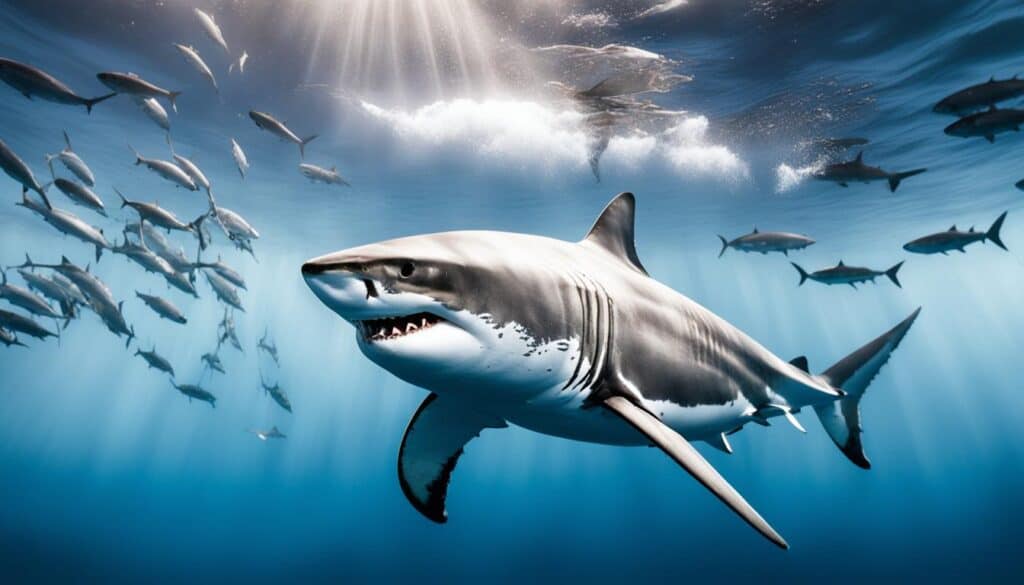Sharks have fascinated and scared people for centuries, thanks to movies and stories. These stories often make sharks seem like mindless killers. But the truth is different. This article will clear up these misconceptions by sharing facts and debunking myths about sharks.
By learning the truth, you’ll understand sharks better and see their importance in the ocean. It’s important to respect and protect these amazing creatures. This knowledge helps us all work together to save sharks.
Understanding Sharks: The Basics
Sharks are fascinating creatures with over 500 known species. They come in all shapes and sizes, each playing a vital role in the ocean. It’s important to know that not all sharks are the same. By learning about their diversity, we can understand their importance in the ecosystem.
Shark Species Diversity
Sharks range from the huge whale shark, which eats plankton, to the mighty great white shark, a top predator. Here are a few examples of the amazing variety among sharks:
- Whale Shark: The largest shark species, capable of growing up to 40 feet long.
- Bull Shark: Notable for its ability to thrive in freshwater, making it a versatile predator.
- Hammerhead Shark: Recognizable for its unique head shape, which aids in hunting.
- Blue Shark: Known for its slender body and long migrations across oceans.
The Role of Sharks in Marine Ecosystems
Sharks play a crucial role in the ocean. As top predators, they keep the balance of life in the sea. When sharks are healthy, so are the oceans. But if they decline, the whole ecosystem can be affected.
This shows why it’s important to know the truth about sharks. Misunderstandings can harm conservation efforts and education. We need to separate shark facts from myths to protect these amazing creatures.
What are the most common myths about sharks?
Sharks often face many myths that change how people see them. These myths come from the media, which sometimes makes them seem more dangerous than they are. It’s important to clear up these misconceptions to better understand these amazing creatures.
Many think all sharks want to eat people. But, most sharks are not a threat to humans. Movies and stories have made them seem more dangerous than they really are. Efforts to teach people the truth help debunk these myths.
Some believe all sharks are dangerous. But, many are harmless and important to their ecosystems. For example, the whale shark eats plankton, not large prey. Learning about the different types of sharks helps challenge these misconceptions.
It’s also a myth that sharks will attack humans without reason. Sharks usually bite out of curiosity, not aggression. Teaching people about this can help reduce fear and misunderstanding.
| Myth | Fact |
|---|---|
| All sharks are man-eaters. | Most species pose little to no threat to humans. |
| All sharks are dangerous. | Many species, such as the whale shark, are harmless. |
| Sharks attack humans on sight. | Sharks often bite out of curiosity, not aggression. |
By learning and sharing the truth about these myths, we can help change how people see sharks. This can lead to better conservation and respect for these vital marine animals.
Debunking the “Man-Eater” Myth
The myth about man-eating sharks has led many to fear these creatures. But, most shark and human interactions are based on misunderstanding, not a desire to hunt humans. Learning about sharks can ease our fears and help us live alongside them.
Sharks vs. Humans: The Facts
Looking into sharks and humans shows that most shark encounters with people don’t end in attacks. Sharks often mistake humans for their natural food, like seals. This fact helps us see sharks as misunderstood ocean animals, not as man-eaters.
Statistics on Shark Attacks
Shark attack statistics show they’re not the fearsome predators we think. In the U.S., there are about 45 unprovoked shark attacks a year, with only one or two being fatal. Here’s how shark risks compare to other dangers:
| Risk | Annual Incidents | Fatalities |
|---|---|---|
| Shark Attacks | 45 | 1-2 |
| Dog Attacks | 4,500,000+ | 20-30 |
| Lightning Strikes | 20,000 | 20-30 |
| Deer Vehicle Collisions | 1,000,000+ | 200+ |
These numbers show sharks are much less of a risk compared to other dangers. Understanding the man-eater myth helps us see sharks correctly. It also shows why we should protect these important sea creatures.
Shark Behavior and Intelligence
Sharks are often seen as scary creatures, but they are much more complex. They have amazing cognitive skills and show complex social behaviors. This shows they are not just simple predators.
Sharks as Complex Creatures
Sharks have a variety of behaviors and adaptations. Many form groups and hunt together. This shows they are not just alone in the ocean.
They communicate with each other using body language. This proves they can send messages and learn from each other. It highlights their intelligence and ability to adapt.
Do Sharks Need to Swim Constantly?
Many wonder if sharks always need to swim. The answer is not simple. Some sharks, like great whites and mako sharks, must keep moving to breathe. Others, like nurse sharks, can stay still and breathe by pumping water over their gills.
This shows sharks have different ways to survive. It proves not all sharks need to swim all the time.

The Ecosystem Impact of Sharks
Sharks play a key role in keeping the oceans healthy. They are at the top of the food chain. This means they control the numbers of other sea creatures, keeping the balance right for all marine life.
The Importance of Shark Conservation
Sharks are vital to the ocean’s health, but they face many threats. Overfishing and shark finning are causing their numbers to drop fast. If sharks disappear, it can lead to too many other species and harm the ocean’s balance. Saving sharks helps protect the ocean and its many creatures.
Ecotourism and Sharks
Ecotourism can help save sharks. By visiting sharks in their home, you support local communities and learn about their importance. This way, you help protect sharks and ensure they will be around for future generations to enjoy.
| Conservation Strategies | Description | Impact on Ecosystems |
|---|---|---|
| Marine Protected Areas | Designated regions where fishing and other human activities are restricted or managed. | Helps restore shark populations, leading to healthier marine environments. |
| Community Engagement | Involving local communities in conservation efforts. | Encourages sustainable practices and a shared interest in the preservation of sharks. |
| Ecotourism Programs | Tourism focused on observing and protecting natural populations in their habitats. | Provides economic incentives to conserve shark populations and habitats. |
Common Misconceptions Exposed
This article has shown you many shark myths spread by urban legends. These myths often make people wrongly fear these amazing animals. The media often makes sharks seem like monsters, not the important parts of their ecosystems they really are.
Looking at the facts, we see sharks aren’t the bad guys they’re made out to be. Studies show they are smart, complex, and play a key role in the ocean’s balance. Knowing this helps us see sharks as vital to the ocean’s health.
Now, it’s up to you to spread the truth and build a culture that respects sharks. As you learn more, it’s crucial to fight these deep-rooted myths. The more you know about sharks, the better you can help protect them and reduce fear based on lies.
FAQ
Are all sharks dangerous to humans?
No, not all sharks are dangerous to humans. Most sharks are harmless and like to stay away from people.
Do sharks really attack humans on sight?
No, shark attacks are rare. They usually happen by mistake or out of curiosity. Sharks don’t look for humans to eat.
Is it true that sharks must constantly swim to breathe?
Some sharks need to swim to breathe by moving water over their gills. But others can stay still and breathe by pumping water over their gills.
How many species of sharks are there?
There are about 500 different shark species. They range from the big whale shark to the powerful great white.
What role do sharks play in marine ecosystems?
Sharks are top predators that keep fish populations in check. This helps maintain a healthy ocean, which is important for the ocean’s health.
Why are shark conservation efforts important?
Saving sharks is crucial because losing them can upset the balance in the ocean. This can harm the ocean’s health and its many species.
Are there any common myths about sharks that are not true?
Yes, many myths exist about sharks. For example, not all sharks are man-eaters, and they don’t attack humans because they’re aggressive.
How have media portrayals influenced public perception of sharks?
Media has made people fear sharks more than they should. It often shows them in a bad light, not showing their true role in the ocean.







